Equity Bank Bundle
Can Equity Bank Continue Its Remarkable Ascent?
From a humble building society in Kenya to a financial giant spanning East and Central Africa, Equity Bank's transformation is a compelling story of strategic vision and execution. Its unwavering commitment to financial inclusion has fueled its impressive growth, serving over 21 million customers and boasting assets exceeding KSh 1.70 trillion. This Equity Bank SWOT Analysis delves into the core strategies driving this success.
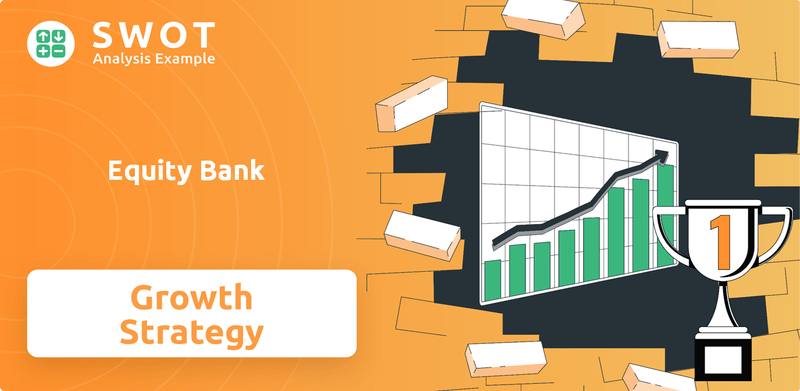
Equity Bank's journey, marked by its transition to a commercial bank and strategic acquisitions, including the recent merger in Rwanda, highlights its ambitious expansion plans. This company analysis explores the key drivers of its financial performance, including its digital banking services and customer acquisition strategies. Understanding Equity Bank's competitive advantage and navigating the impact of economic factors are crucial for assessing its investment opportunities and long-term sustainability. The future prospects for Equity Bank are promising, with continued focus on strategic initiatives and disciplined financial planning.
How Is Equity Bank Expanding Its Reach?
Equity Bank's Equity Bank growth strategy is significantly shaped by its expansion initiatives, which are primarily focused on regional growth, product diversification, and strategic acquisitions. This approach is underpinned by the Africa Recovery and Resilience Plan (ARRP), which guides its strategic direction. The bank's commitment to expanding its footprint and service offerings is evident in its recent activities and future plans.
The group's regional subsidiaries are crucial to its growth, contributing substantially to its financial performance. These subsidiaries diversify the revenue base and enhance the bank's market share. This strategic focus on regional expansion is a key component of the Equity Bank future prospects.
Equity Bank's expansion strategy involves both organic growth and strategic acquisitions to strengthen its market presence and access new customer segments. The bank's performance in FY 2024 reflects the success of these strategies. The bank has demonstrated a commitment to innovation and customer empowerment through its product offerings and initiatives.
Regional subsidiaries are vital, contributing significantly to overall financial performance. In FY 2024, these subsidiaries accounted for 49% of total assets, 48% of total loans, and 54% of profit before tax. This regional focus diversifies the revenue base and enhances the bank's market share.
Equity Bank Rwanda's revenue grew by 36% year-on-year, with a corresponding profit after tax increase of 30%. Equity Bank Tanzania saw a 20% revenue increase and a 107% rise in profit after tax. EquityBCDC's revenue grew by 9%, and profit after tax increased by 29%.
Equity Bancshares, Inc. completed the acquisition of KansasLand Bancshares, Inc. in July 2024, expanding its presence in Kansas. In April 2025, Equity Bank acquired NBC Oklahoma, further increasing its network in the United States. These acquisitions aim to broaden its customer base and strengthen its market presence.
The Bancassurance unit saw a 6% increase in premium collections in FY 2024. The bank is investing in talent development, digital transformation, and process enhancements to drive further growth in this area. The launch of 'Abakyala Ku Ntiiko' in March 2025 and 'Digitokaboxi' in September 2024 demonstrates the bank's commitment to innovation and customer empowerment.
Equity Bank is actively diversifying its offerings beyond traditional banking to enhance its Equity Bank financial performance and Equity Bank market share. The Bancassurance unit saw a 6% increase in premium collections in FY 2024, indicating strong growth potential. The bank is also investing in talent development, digital transformation, and process enhancements to unlock further growth in this area. Furthermore, initiatives like 'Abakyala Ku Ntiiko' and 'Digitokaboxi' highlight the bank's focus on customer empowerment and innovation. For a deeper understanding of the competitive landscape, consider exploring the Competitors Landscape of Equity Bank.
Equity Bank's expansion strategy is multi-faceted, encompassing regional growth, strategic acquisitions, and product diversification. These initiatives are designed to enhance the bank's Equity Bank competitive advantage analysis and ensure sustainable growth. The bank's focus on digital banking services and customer-centric products, such as the 'Equi-Mama suite,' highlights its commitment to innovation and customer empowerment.
- Regional Expansion: Focused on growing its presence in key African markets, as well as in the United States through strategic acquisitions.
- Product Diversification: Expanding offerings beyond traditional banking, including Bancassurance and innovative digital products.
- Customer Empowerment: Initiatives like 'Abakyala Ku Ntiiko' and 'Digitokaboxi' are designed to support specific customer segments.
- Digital Transformation: Investing in digital banking services and mobile banking platform to enhance customer experience and operational efficiency.
Equity Bank SWOT Analysis
- Complete SWOT Breakdown
- Fully Customizable
- Editable in Excel & Word
- Professional Formatting
- Investor-Ready Format
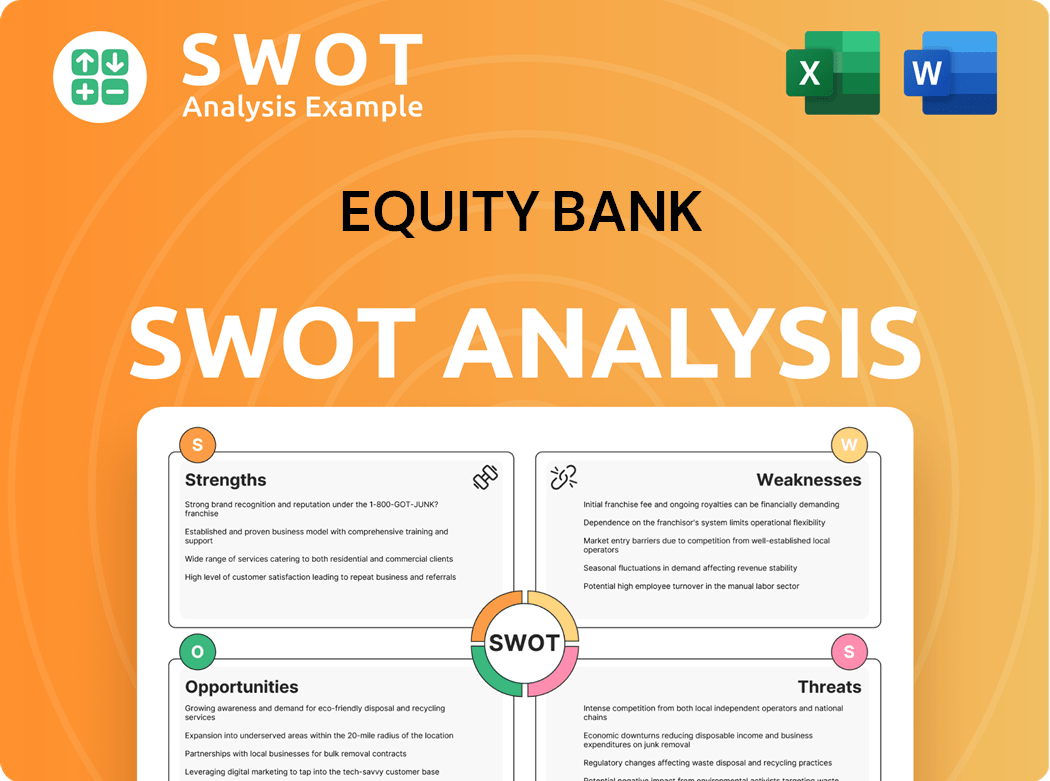
How Does Equity Bank Invest in Innovation?
The digital transformation at Equity Bank is central to its growth strategy, reflecting evolving customer needs for convenience, security, and accessibility. This approach is crucial for enhancing customer experiences and operational efficiency. The bank's focus on digital solutions directly addresses the growing demand for seamless and user-friendly banking interactions.
Equity Bank's strategy emphasizes digital-first services and innovative product offerings to meet customer preferences. The bank's investment in technology and digital platforms aims to provide customers with greater control and flexibility in managing their finances. This customer-centric approach is key to maintaining a competitive edge in the financial sector.
Equity Bank is consistently leveraging technology and innovation to drive sustained growth, with digital transformation being a top priority. The bank has significantly modernized its digital channels, with 86% of all transactions now processed digitally, leading to cost savings and enhanced operational efficiency. This digital-first approach is central to its strategy, reducing reliance on physical infrastructure.
Equity Bank's digital channels have experienced significant growth. Transactions via Equity Mobile surged by 67% year-on-year, from KSh 1.895 trillion to KSh 3.174 trillion in FY 2024. The online business platform, EazzyBiz, also saw a 21% increase, rising from KSh 3.165 trillion to KSh 3.841 trillion.
The bank's interoperable payment service, Pay With Equity (PWE), saw a 14% increase in merchant transactions, growing from KSh 1.884 trillion to KSh 2.149 trillion. ATM usage also rose by 21%, reaching KSh 481.4 billion, partly due to the introduction of Cash Deposit Machines.
Equity Bank has invested heavily in technology, critical infrastructure, and diversification as part of its ongoing transformation. This investment supports the bank's strategic initiatives to enhance customer experience and operational efficiency. The bank continues to explore Equity Bank's target market to refine its services.
The 'ONE Equity' integrated digital platform allows customers to access a wide range of products and services under a single umbrella, enhancing cross-selling and customer engagement. This platform simplifies banking for customers.
Equity Bank launched new products in 2024, such as SimplyInvest, a robo-advisor, and EarlyPay, which facilitates early access to direct deposits. These products are designed to empower financial well-being and attract new customers.
Equity Bank is launching digital offerings in 2025, including account opening and online banking in Spanish, along with a fully translated website, to cater to a broader customer base. This expansion will help Equity Bank to expand its market share.
Equity Bank's leadership in innovation is further evidenced by being ranked the 2nd strongest banking brand globally by Brand Finance in 2024 and the most valuable brand in East and Central Africa, with its value rising to USD 450 million. The bank's strong brand value reflects its successful growth strategy.
- Equity Bank's digital transformation initiatives have significantly improved customer satisfaction and operational efficiency.
- The bank's investment in technology has enhanced its competitive advantage, enabling it to offer innovative financial solutions.
- The launch of new products and services has broadened its customer base and increased revenue streams.
- Expansion into new markets and digital offerings will drive future growth and profitability.
Equity Bank PESTLE Analysis
- Covers All 6 PESTLE Categories
- No Research Needed – Save Hours of Work
- Built by Experts, Trusted by Consultants
- Instant Download, Ready to Use
- 100% Editable, Fully Customizable
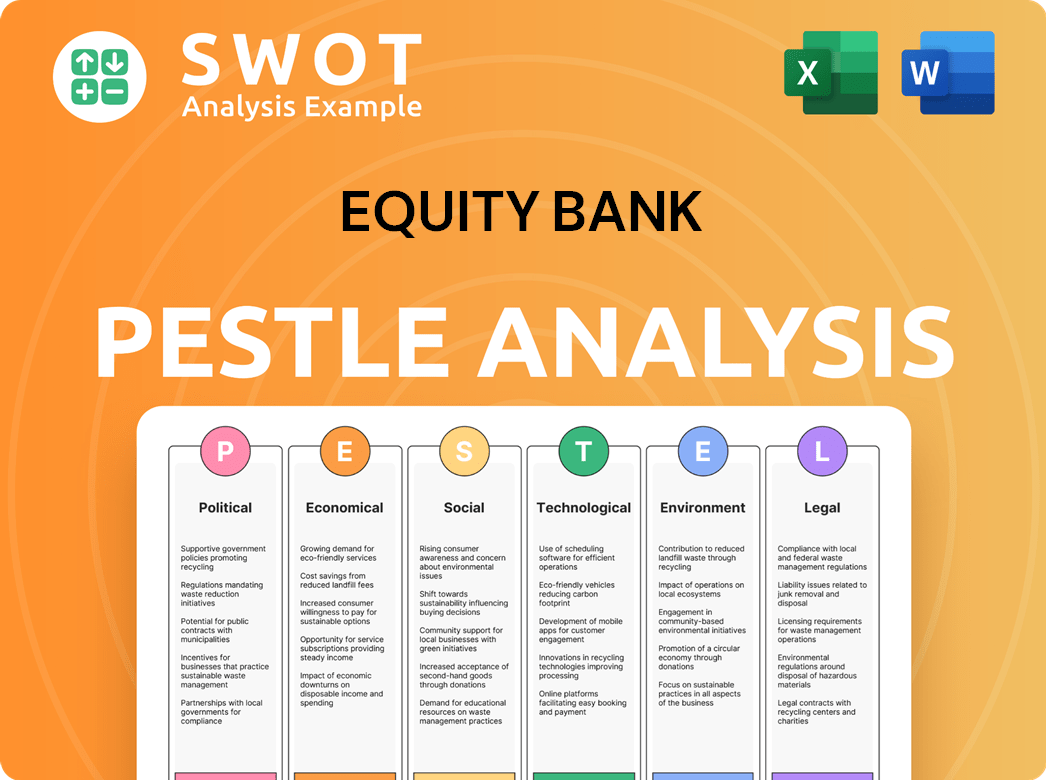
What Is Equity Bank’s Growth Forecast?
In FY 2024, Equity Bank demonstrated robust Equity Bank financial performance. The bank's Equity Bank growth strategy led to a 17% year-on-year increase in profit before tax, reaching KSh 60.7 billion. Net profit after tax also saw a significant rise, up 12% to KSh 48.8 billion, with earnings per share increasing by 11% to KSh 12.3.
The bank's financial health is further underscored by its total deposits, which reached KSh 1.4 trillion, and an expanded customer base of 21.6 million. The Equity Bank market share and profitability are reflected in a Return on Equity (ROE) of 19.8%. These results highlight the bank's strong position despite facing macroeconomic challenges.
Despite facing a challenging macroeconomic environment, Equity Group achieved a 6.7% revenue growth, supported by diversification across geographies and product lines. The bank's strategic initiatives, as detailed in a Brief History of Equity Bank, have enabled it to navigate economic headwinds effectively. The bank's resilience is evident in its ability to maintain profitability and expand its customer base.
Net interest income grew modestly by 3.73% to KSh 108.7 billion. This growth was driven by a 5.3% increase in income from loans and a 9.9% rise in government securities income. However, interest expense on customer deposits significantly increased by 45%, reflecting higher funding costs.
Non-interest income increased by 10.7% to KSh 85.1 billion. This growth was primarily supported by higher lending fees. This diversification in income streams helps to cushion the bank against fluctuations in interest rates.
The bank declared a higher full-year dividend of KES 4.25 per share, up from KES 4.00 in the previous year. This translates to a payout ratio of 34%, which aligns with its dividend policy. This demonstrates the bank's commitment to rewarding shareholders.
For FY 2025, Equity Bank Kenya anticipates loan book growth of approximately 7.5% to 12.5%, spurred by a recent reduction in its base lending rate. The group aims to expand its deposit book by 7.5%-12.5% in the coming years, despite missing its 2024 growth targets due to economic shocks.
As of March 28, 2025, Equity Group's stock was trading at KES 47.10, with a Price-to-Book Ratio of 0.8. This presents an attractive entry opportunity for long-term investors. This valuation suggests the stock may be undervalued relative to its book value.
The NPL ratio has been rising, reflecting the challenging macroeconomic environment. Managing and mitigating the impact of NPLs is a key focus area for the bank. This requires robust risk management strategies.
Equity Bank Business Model Canvas
- Complete 9-Block Business Model Canvas
- Effortlessly Communicate Your Business Strategy
- Investor-Ready BMC Format
- 100% Editable and Customizable
- Clear and Structured Layout
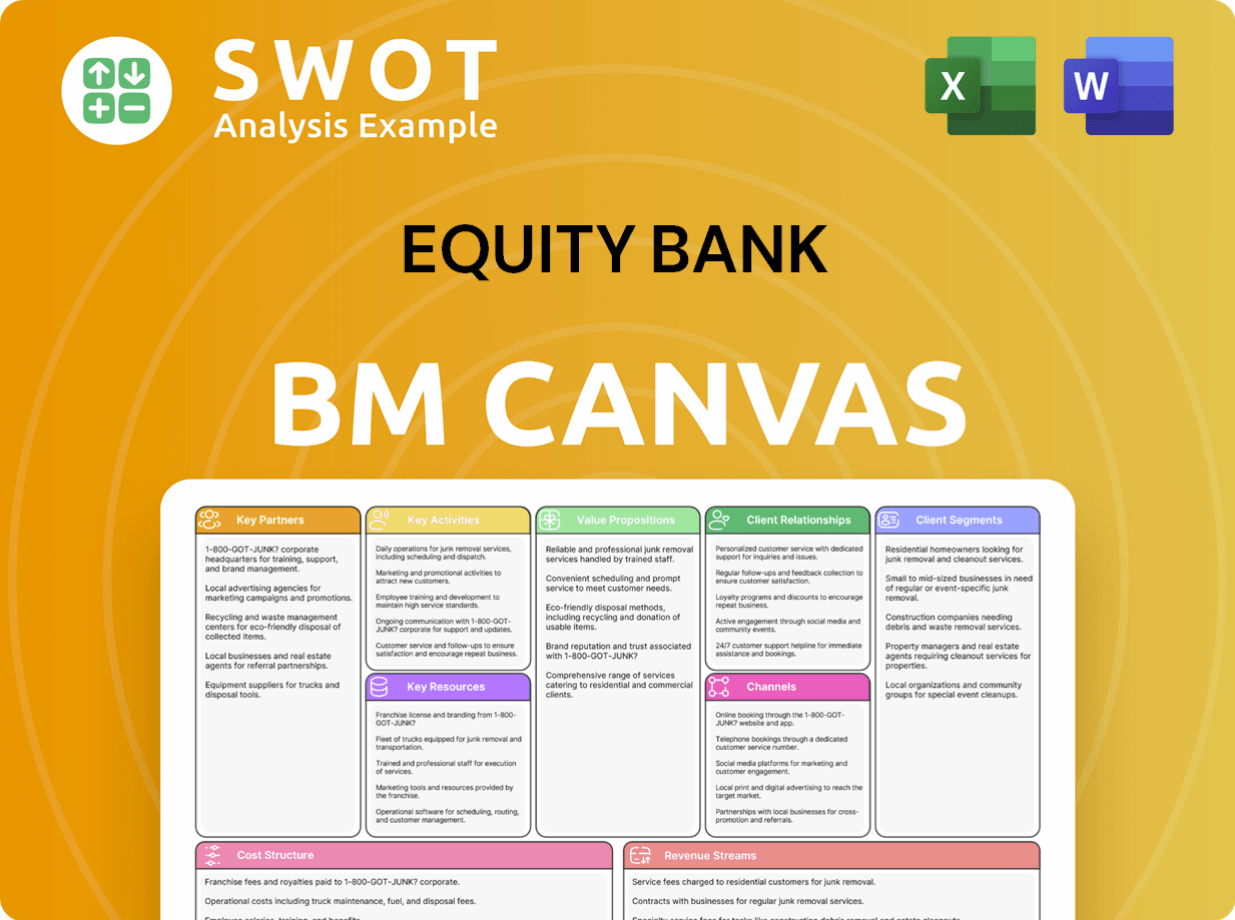
What Risks Could Slow Equity Bank’s Growth?
The path to growth for Equity Bank is not without its challenges. Several risks and obstacles could potentially hinder the bank's strategic initiatives and impact its financial performance. Understanding these challenges is crucial for investors and stakeholders evaluating Equity Bank's future prospects.
The bank faces risks from market competition, regulatory changes, and broader macroeconomic factors. These factors can influence Equity Bank's market share and its ability to execute its expansion plans. The evolving financial landscape, including technological disruptions, also presents significant hurdles.
Global economic conditions and geopolitical uncertainties pose considerable challenges for Equity Bank. Adverse economic conditions and higher interest rates are increasing default risk. This is particularly evident in the corporate segment, where non-performing loans (NPLs) remain a concern. The Revenue Streams & Business Model of Equity Bank showcases how the bank navigates these risks.
Intense competition from other financial institutions and bank holding companies can affect Equity Bank's customer acquisition strategies. The competitive landscape may pressure margins and require the bank to continuously innovate to maintain its competitive advantage analysis. This competition can influence Equity Bank's profitability trends.
Inflation, interest rate fluctuations, and changes in consumer spending, borrowing, and savings habits can significantly impact Equity Bank. These economic factors directly affect the bank's financial results review and the overall stability of its operations. The impact of economic factors is a key consideration.
Deteriorating asset quality, particularly in corporate lending, presents a risk. Equity Bank Kenya's NPL ratio was at 17.4% in FY 2024, reflecting these challenges. Fluctuations in collateral values and loan reserves also pose risks to the bank's financial performance.
Technological advancements and the rise of non-bank financial institutions and digital attacker banks pose a constant threat. The development of generative AI programs adds complexity and risk to cybersecurity. Adapting to these changes is critical for Equity Bank's digital banking services.
Geopolitical uncertainties can affect Equity Bank's expansion into new markets and its overall operations. These risks can lead to instability and impact the bank's ability to execute its strategic initiatives 2024. The need for robust risk management strategies is paramount.
Changes in financial regulations can significantly impact Equity Bank's operations and compliance costs. Adapting to new regulatory requirements is essential for maintaining compliance and avoiding penalties. These changes can influence Equity Bank's investment opportunities.
Equity Bank employs a tri-engine model, integrating commercial, social, and sustainability priorities. This approach is aimed at fostering sustainable economic growth and creating a positive societal impact. The bank's continued investment in technology, critical infrastructure, and diversification aims to build resilience and maintain its leadership position.
The Group's overall NPL ratio stood at 12.96% in FY 2024, an increase from 11.44% in FY 2023, though it compares favorably with an industry average of 16.4%. Loan loss provisions amounted to KSh 20.2 billion in FY 2024, with an NPL coverage of 71%. The strength and increasing contribution of its regional subsidiaries are expected to mitigate challenges faced by the Kenyan unit, providing stability amid market pressures.
Equity Bank Porter's Five Forces Analysis
- Covers All 5 Competitive Forces in Detail
- Structured for Consultants, Students, and Founders
- 100% Editable in Microsoft Word & Excel
- Instant Digital Download – Use Immediately
- Compatible with Mac & PC – Fully Unlocked
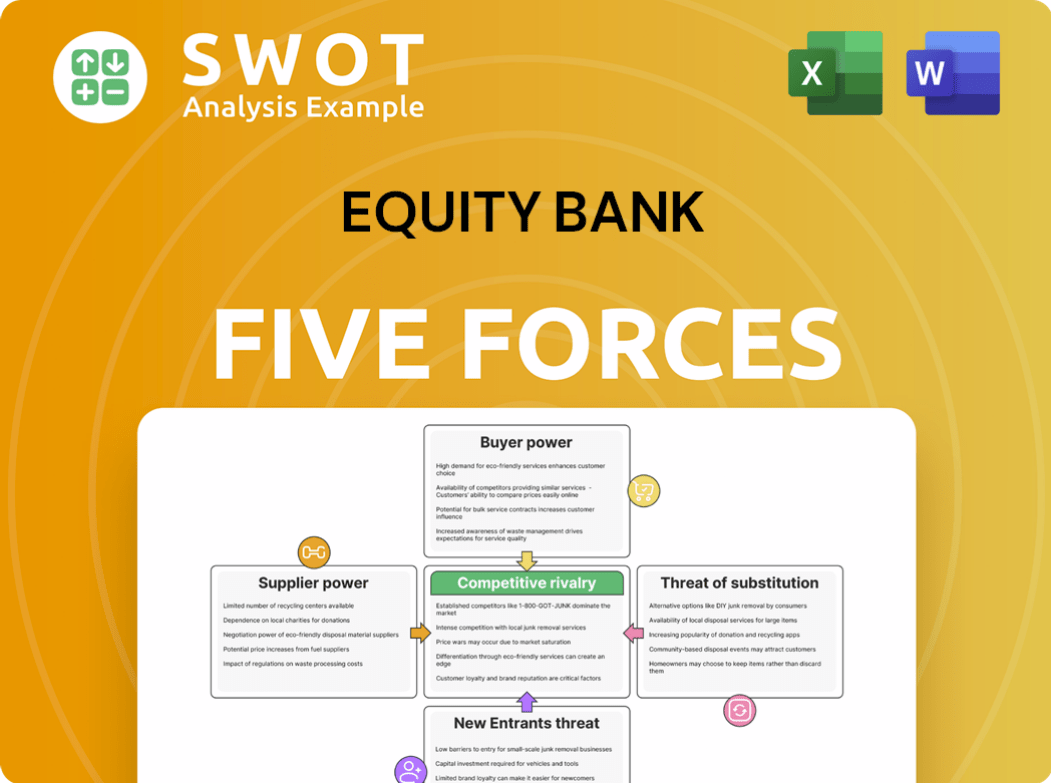
Related Blogs
- What are Mission Vision & Core Values of Equity Bank Company?
- What is Competitive Landscape of Equity Bank Company?
- How Does Equity Bank Company Work?
- What is Sales and Marketing Strategy of Equity Bank Company?
- What is Brief History of Equity Bank Company?
- Who Owns Equity Bank Company?
- What is Customer Demographics and Target Market of Equity Bank Company?
Disclaimer
All information, articles, and product details provided on this website are for general informational and educational purposes only. We do not claim any ownership over, nor do we intend to infringe upon, any trademarks, copyrights, logos, brand names, or other intellectual property mentioned or depicted on this site. Such intellectual property remains the property of its respective owners, and any references here are made solely for identification or informational purposes, without implying any affiliation, endorsement, or partnership.
We make no representations or warranties, express or implied, regarding the accuracy, completeness, or suitability of any content or products presented. Nothing on this website should be construed as legal, tax, investment, financial, medical, or other professional advice. In addition, no part of this site—including articles or product references—constitutes a solicitation, recommendation, endorsement, advertisement, or offer to buy or sell any securities, franchises, or other financial instruments, particularly in jurisdictions where such activity would be unlawful.
All content is of a general nature and may not address the specific circumstances of any individual or entity. It is not a substitute for professional advice or services. Any actions you take based on the information provided here are strictly at your own risk. You accept full responsibility for any decisions or outcomes arising from your use of this website and agree to release us from any liability in connection with your use of, or reliance upon, the content or products found herein.